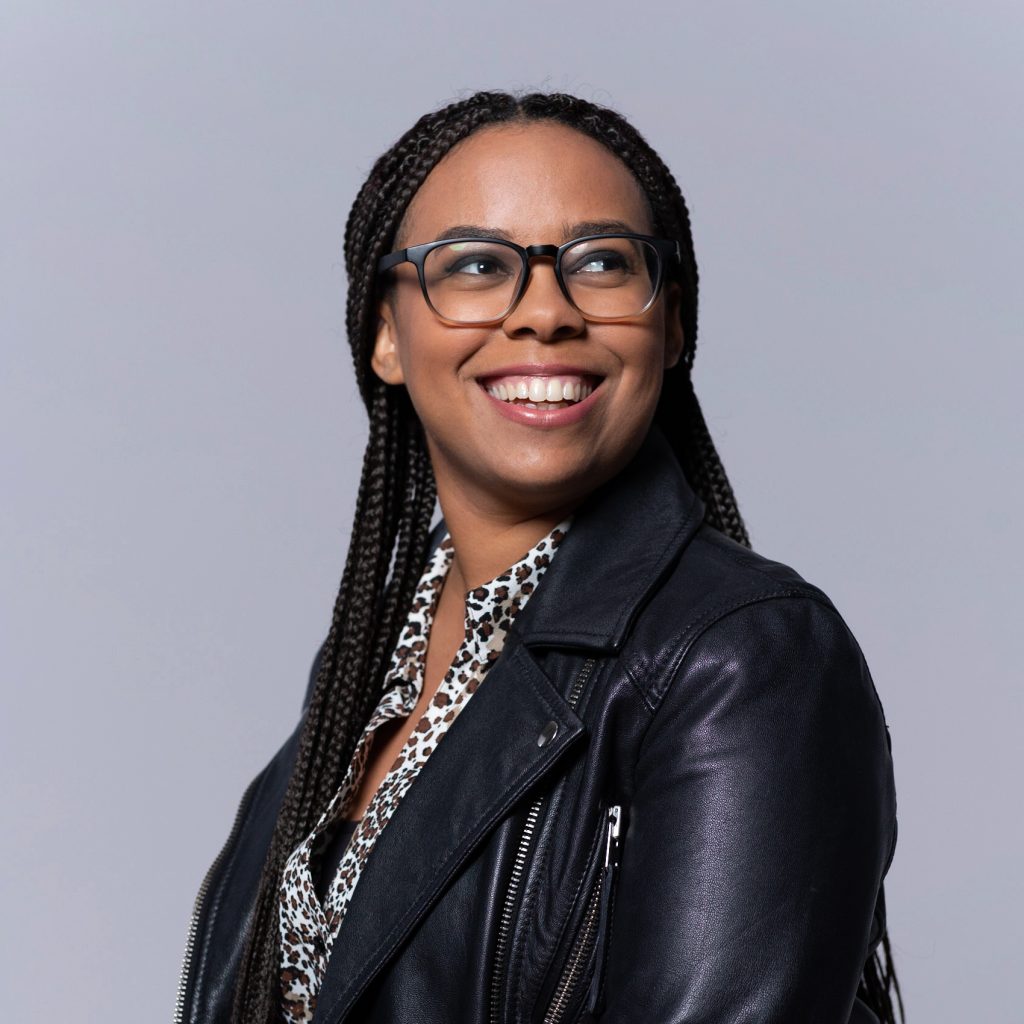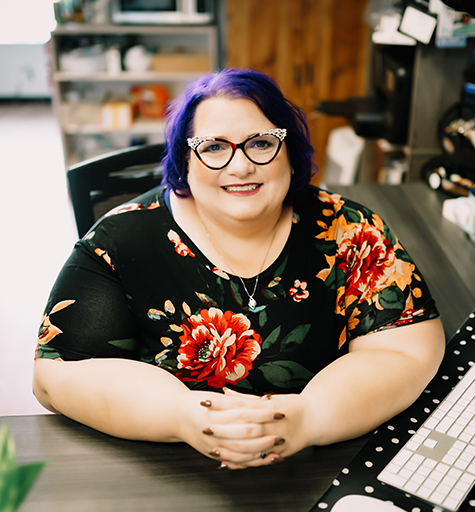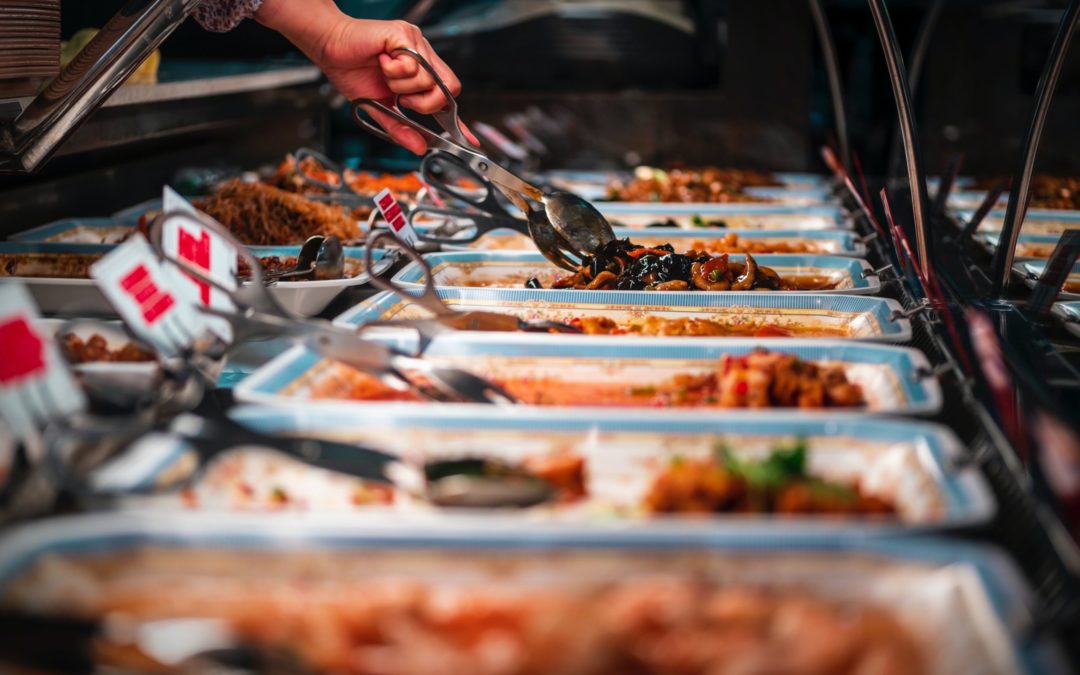Show Notes
In this episode, Michelle meets up with Michele Butcher-Jones to discuss the challenges of dealing with food at WordCamps and other conferences. Namely, the issue of not being able to eat an event due to food allergens, cultural concerns, etc.
Episode Transcript
Speaker 1:
Welcome to the Underrepresented In Tech podcast, hosted by Michelle Frechette and Allie Nimmons. Underrepresented in Tech is a free database built with the goal of helping people find new opportunities in WordPress and tech overall.
Michelle Frechette:
Hi Michelle.
Michelle:
Hey Michelle.
Michelle Frechette:
How are you today?
Michelle:
I’m glad it’s Thursday and not Wednesday. How about yourself?
Michelle Frechette:
I’m glad it’s Thursday. I’ll be even happier when it’s Friday or Friday night is okay too. I’m looking forward to the weekend. That’s all I’ll say. For anybody listening. Usually I say, “Hi Allie”, but Allie’s under the weather today, so she’s not able to record. And I thought what a great opportunity to talk about something that’s kind of weirdly risen up because of a question I asked on Twitter yesterday, which is about, I asked people what their favorite meals at Word Camps, at any Word camp was, and as a result of that, people have been talking about when their meals haven’t been able to be accommodated. So a couple people wrote about times that they didn’t get to eat at Word camps because of allergens, food allergens, and there’s a lot of people for whom that’s been true. Also, other people I know for sure at Word Camps, I’m not going to start naming specific Word camps, but didn’t get a kosher meal.
And kosher is super important for people who keep kosher. Or couldn’t find a meal without that was grain-free so that if they are Celiac, they weren’t able to be accommodated, that kind of thing. And I reached out to you when Allie was under the weather because you and I are friends and I know that you have an allergy and that you’ve had some difficulties being accommodated at Word Camps in the past. So before we start talking about that, tell me when you think back of all the different Word Camps, and you and I have been to a lot of Word Camps, when you think back, what was one of your favorite meals at a Word Camp that you could eat?
Michelle:
I’m going to actually brag on, it’s my home Word camp, but it actually doesn’t really matter because I’ve never been one of them who dealt with the food at Word Camp St. Louis and in subsequently Word Camp US 2019. That was in St. Louis. Because for me, I have to say, no way, to whey. I am very highly allergic to whey. Like swelling throat, sick with the stomach issues. Whole 9 yards. It’s not a very fun time.
Michelle Frechette:
And if somebody doesn’t know what whey is, whey is a dairy product, byproduct, right?
Michelle:
Yes. Whey is one of the two proteins that is in milk products. One is the whey, one is kcm, and then there is a lot of people who actually have an intolerance to the lactic acid in it. And so when it comes to milk, you could have one of three different things or a combination thereof, and we were able to nail mine down to whey. So it’s pretty much like I can’t do any raw dairy. A lot of your soft cheeses, I can’t do. I really miss actual pizza, not like the fake cheese pizza. And I really miss your old school Kraft Macaroni and Cheese, but they’re powder is whey.
Michelle Frechette:
Filled with way. Yeah. So you are not Little Miss Muffet because you were not sitting on a tuffet eating curds and whey.
Michelle:
No.
Michelle Frechette:
Put the dad joke out there to begin with. Okay, go ahead.
Michelle:
I wish I could. With Word Camp St. Louis, before we had Word Camp US, we would always have a barbecue day done by Salt Fire, which is amazing. And then another day we would have pizza that was done by a locally owned called Pie Pizza. And when we found out that I was allergic to the whey and couldn’t do pizzas anymore, I mentioned it to them, but really didn’t think that much about it because a lot of places don’t really accommodate too much on Work Camps, other things I’ve been to, even work meetups. I’ve always had issues with dealing with the dairy allergy.
And when the food came for our pizza day, Jen Swisher, the head organizer, comes walking over to me with a box and was like, here’s your dairy free pizza. I made sure it has meat on it because you are not vegan. Because that’s the one thing I do get a lot is like, I need a dairy free meal. “Oh, you need vegan?” No, no. I love and appreciate and must have my protein, especially I love me some red meat. I just can’t like, say you make a big sandwich, just take the cheese off or I can’t do ranch dressing and different things like that. But yeah, mama still wants her meat.
Michelle Frechette:
So bring on the pepperoni, hold the mozzarella. That’s what I just heard.
Michelle:
Yes.
Michelle Frechette:
So one of the things that you know, you and I roomed together at Word Camp US 2022.
Michelle:
It was a fabulous time.
Michelle Frechette:
It was a fabulous time, but you got to experience all of those things that I wrote about in my five days without a shower article on post status, which was basically that there was a lot about that venue that was inaccessible and people took that to heart. So there have been changes already being made in WordPress. So for example, the Word Camp organizer’s handbook now has a section about accessibility to make sure that people can get in and out of doors and all those kinds of things that were just so frustrating to me there. One of the things I wrote about in that article too was this issue where I know that somebody wasn’t able to get a kosher meal and ended up eating granola bars for lunch one day. You couldn’t be sure that there wasn’t dairy in one of the meals and that they tried to give you vegan instead.
And you were like, “Look, I want the meal. I just need to make sure there’s no cheese in it. Those kinds of things. One of the things that has come about from that is that this year for Word Camp US, that, by the way, if you’re interested in organizing, the call for organizers is open right now. But I was asked if I would join the team in the role that I had suggested, which would be that we have somebody there whose sole focus for Word Camp US is, or for Word camps in general, is focusing on accessibility and accommodations. So it’s not enough just to say, “Oh, we’ve got ramp, we’ve got curb cuts so wheelchairs can get in. There’s an elevator so people can get to the second floor.” Those kinds of things. If we’re going to be truly accommodating to people with special needs, we also have to think about diet.
And while perhaps having a whey allergy doesn’t make you underrepresented in what we think of as the traditional underrepresented tech, nobody’s like, “Ugh, we’re not hiring her because she can’t eat cheese.” I mean, it’s not like that, but it still is an issue of accommodation and that we talk about DEIB, and that B in DEIB, is belonging. And if you show up to a meal and you can’t eat it, you no longer have that B. You will no longer feel like you belong. You feel like the outcast, right?
So I’ve gone to places before where I cannot access the entire venue. Usually, that’s fine. Usually there’s enough for me to be able to access, that I still feel included. People come talk to me. I may not get to see that one room at that museum or something. Big deal. For me that’s not as big a deal. But if I couldn’t eat the food and the whole thing is sitting down to have a meal together, now I really would feel excluded. And I imagine that’s how you and others who don’t have their meals accommodated actually feel. So I’m putting words in your mouth, but tell me from your perspective, what does that feel like?
Michelle:
And it makes it hard in both, in a way, on the mental and physical when it comes to the belonging of it. Because for the mental and emotional, you want to be there and able to eat with everyone and enjoy the experience. And some places, sometimes some venues, some events are really good about accommodating for things. Even if you’re just like, “Oh, I forgot to mention I’m allergic to whey. Can you help me out?” “Yeah, we can put a salad together and get you some vinegarette. We’ll work something out. I’ll throw some chicken on top of the salad for you.” In other places, events, things can make you really feel like you’re being a burden to them on it. And so that can really affect your mental on it as well. And then also when you’re dealing with an allergy that you get later on in life, there is a huge grief process that goes through it as well that a lot of people don’t talk about.
So if you’re early on in say, a dairy allergy or a soy allergy and the meal is pizza or the meal is spaghetti, or you’re newly gluten free and there’s nothing there you can do, it really just makes you feel an outcast. And then also you do get a lot of those grief things and then you have people like, “Michelle, why aren’t you eating? Oh, this is amazing.” And it just grows from there. But then also there are physical ramifications for that because if you’ve ever seen myself hangry, you’ll know that there’s definitely a physical part of it.
Because if you are someone who like me actually, who does require a lot of protein due to a genetic disorder I have, if my protein gets too low or if I haven’t eaten in a while, I will get the shakes and I’ll get very irritable. I can sometimes have a bit of issues walking. It’s physically also just a hard thing. I’m now one who have learned, I carry a little lunch bag with me, even when I fly, that has beef jerky and peanut butter and different things that I can eat no matter where I’m at. Even when I went to State of the Word, I took a little package of dried chicken noodle soup before in the event, there’s nothing there that I could eat because I don’t want to go like six hours without something.
Michelle Frechette:
Right. No, that makes perfect sense. And I hadn’t thought about that. For sure. I mean, I was talking about the emotional part of it, feeling like you belong. But yeah, being hungry sucks. You don’t want to be the one who, “Oh, well, you can’t have anything else. Well, here’s a salad with nothing on it.” “Great. I’ll just go over here and eat my bowl of lettuce while everybody else has a really good meal.” Yeah, there’s a lot to being hungry. And let’s face it, a little bowl of lettuce is not going to not make you hungry an hour later for sure.
Michelle:
Yeah, 27 minutes later you’re back to being like, “I can bite someone’s arm. I’m so hungry.”
Michelle Frechette:
Exactly. And there is protein when you bite somebody’s arm. Just for the record. I can’t guarantee there’s no gluten though, but okay, maybe not. But yeah, so it’s super important. And I know for allergens especially, I mean we’re talking life or death for some people, for sure. We’re talking at the very least, discomfort, and at the very most anaphylaxis with the possibility of death. So allergies are absolutely nothing to be toyed with, but neither is religion. So if somebody needs a kosher meal, you need to be able to provide that for them, whatever their special accommodations are for whether it’s religious purposes or otherwise, we need to respect that. We need to still provide for anybody who’s attending those events.
Michelle:
And the absolute worst thing anyone could say to someone who has a food allergy, a food aversion, because we have a lot of neuro divergent people in the WordPress community.
Michelle Frechette:
True.
Michelle:
Or it be a religious type thing or culture type thing is to say, “Oh, just pick it off.”
Michelle Frechette:
Yeah, no, that’s not a good thing.
And having those foods touch is already a contaminant for somebody, especially with somebody with an allergy, but also somebody who has to keep kosher, for example. You can’t have things touching that haven’t been prepared in a kosher way. So super important. Absolutely. What do you think are some ways that we can accommodate people? So let’s say that we’re at a venue and the kitchen says, “We can’t do that.” What can we do as organizers to make sure that people get food that works for them in a timely fashion?
Michelle:
First, have a backup plan before the event. Talk to the venues in where they’re like, “We can’t accommodate that.” And as you are signing those papers to say, “Yes, we’re going to use you as a venue”, and they say they can’t accommodate special meals or foods, that’s when you put in that contract that for the types of meals you cannot accommodate, we are allowed to say, go to a local restaurant and get foods that can, or we can bring in from grocery stores or something. Make sure there’s a backup plan for that. Two, ask early and ask more definitive questions on it and for specifically what allergies, what aversions and stuff. And then also three, don’t ask so many questions on the why’s of it. Take everyone as if, say, they’re allergic to mushrooms and it’s actually just an inversion. That’s fine. Take everything though as they absolutely cannot have this. Either anaphylaxis, they will die no matter what type of allergy they have or if it’s a religious culture thing, that this will just mess up their view of divinity.
Michelle Frechette:
It’s all serious and all has to be given the same weight and needs to be respected and accommodated. For sure. We had somebody for Work Camp Rochester put down, because we always ask, right? So everything says, do you have any food allergies? I was like, “He’s allergic to cinnamon.” And my first thought was, “What are we going to do with cinnamon?” But then I thought, “Well, the cookies, right?” They’re oftentimes, you have cookies, you need to make sure the cookies don’t have cinnamon in them, then.
Every allergy needs to be considered and you need to look at your menu to make sure that you’re accommodating. And some allergens, the people person can’t be in the room if other people are eating it. So nut allergies are like that, for example. And so it’s like airplanes no longer serve nuts, right? Because you can’t be three rows behind somebody who’s eating nuts and not have anaphylaxis sometimes. And so we just need to make sure that it’s not enough just to not include it for some things, but to take it seriously and not include some things at all if they have the potential to hurt and harm somebody.
Michelle:
And another thing to do for the event, that was actually something I thought of, at Word Camp US 2022, because one of my coworkers was there and she has a crazy soy allergy. Is that, at the start of the event that the venue or whoever’s doing the food catering will hand the organizers a list of all of the ingredients they put in all of the platings for stuff. So then they’re not having to stop in the middle of lunch and pull out the chef who is, pardon me, of that venue or catering to say, “I need to know if this has soy in it.”
Michelle Frechette:
Right.
Michelle:
And I’m not really picking on, I work at US 2022 on this, but it was one of those where I just was like, “Aha. Epiphany on it”, because my coworker and I both had to pull them away and pull them away from their job when they’re trying to actively make the food to let us know what the ingredients are. And it would be so much better to just be able to hand a binder to them and be like, “This is all the ingredients we use and everything.” Because with the cinnamon, you wouldn’t believe how many different types of ingredients are hidden that you don’t know about. Because yes, off the top of your brain, would you say, “Oh, I cannot have that egg roll because an egg roll has cinnamon in it.”?
Michelle Frechette:
You wouldn’t think so.
Michelle:
Many Taiwanese owned restaurants, their egg rolls, especially if you get the bigger ones have cinnamon in them.
Michelle Frechette:
Yeah. You just never know. And it’s exactly right. Something doesn’t have to be sweet to employ cinnamon. Cinnamon, in and of itself, is not a sweet spice. Right? It isn’t very sweet at all. It’s only because we add it to things that are sweet, oftentimes that we think of it that way. But they put it in chili, they put it in all kinds of different things.
Michelle:
Red wine. Red wine and ramen noodles have milk cultures in them.
Michelle Frechette:
And I would never have known that. So yeah, basically what we’re saying is if you were putting on an event, it doesn’t have to be Word Camp, obviously, that’s where we’re talking about our experience. If you’re putting on an event and somebody tells you that they have an allergy or a special dietary need to be accommodated, please take it seriously and please make sure that they are included in a way that still feels like they’re part of the entire event. They can eat with everybody else. They can do the things they need to do and be included and not feel ostracized or off put because of their own special needs. Absolutely. Thank you so much for- Go ahead.
Michelle:
This goes also for the companies who are listening, for the ones who are planning their work retreat stuff.
Michelle Frechette:
Yes, absolutely. Absolutely. Especially when you’re trying to do team building and then you end up ostracizing somebody because of what they can or cannot eat. Absolutely. Well, thanks so much, Michelle, for coming in today to talk about this. I think it’s super important. It’s not something that we necessarily think about. If you are somebody who has a special need, you think about it all the time, but other people aren’t always thinking about you and your needs. If you are somebody with special food needs, please don’t be afraid to speak up and advocate for yourself, and you are not a burden on people in order for you to be included in the event. Yeah. So thank you for being here to talk about it, and if people have any questions, hit us up on Twitter at Underrepresented in Tech. Underrepped in Tech, actually is what it is on Twitter. Or you can dm me at Michelle Ames and I’m sure Michelle would be happy to talk to you too if you have questions as well. So thanks and we’ll see you all next week. Thanks, Michelle.
Michelle:
Thanks for having me.
Speaker 1:
This episode was sponsored by the following companies. Yikes, Inc. Yikes, Inc. Is a collaborative, results driven Philadelphia based WordPress agency dedicated to sustainable business practices. Episode. If you’re interested in sponsoring an episode using our database, or just want to say hi, go to underrepresentedintech.com. See you next week.
This episode was sponsored by YIKES, Inc. YIKES, Inc. is a collaborative, results-driven, Philadelphia-based WordPress agency dedicated to sustainable business practices.

Allie Nimmons
Host

Michelle Frechette
Host


